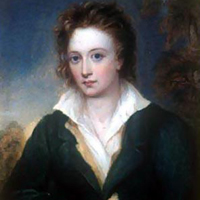Percy Bysshe Shelley - Biography and Works
Percy Bysshe Shelley is a Romantic poet. He was an atheist who refused to concretize his experience and intuition into a philosophy. Wordsworth recognized the artist in him when he praised his style. Shelley was the eldest son of a rich baronet. Born in the country of Sussex on August 4, 1792, he was sent to school at Sion House where he was considered 'a strange unsocial being'.

P. B. Shelley (1792-1822)
His works include Queen Mab, Prometheus Unbound, The Mask of Anarchy and numerous other brilliant lyrical pieces among others.
The experiences at Eton led him to think that the world was full of injustice and tyranny and he took a vow, which found expression in “The Revolt of Islam.” Unused to boys’ society, sensitive, given to daydreaming, fair as a girl, and wearing brown curls, Shelley was the type of a lad destined to be unmercifully bullied, and he seems to have suffered intensely while at school. “He was naturally calm, but when he heard of or read of some flagrant act of injustice, oppression, or cruelty, then indeed the sharpest marks of horror and indignation were visible in his face.”
Shelley fell in love with Mary Wollstonecraft Godwin and fled to France. When he returned to London, Shelley found that the general public, his family, and most of his friends regarded him not only as an atheist and revolutionary, but also as a gross immoralist. Shelley married Mary Godwin and in 1818 moved to Italy; thereafter he saw himself in the role of an alien and outcast, scorned and rejected by the human race to whose welfare he had dedicated his powers and his life.
In Italy Shelley resumed his restless existence, moving from town to town and house to house. His health was usually bad. Within nine months, in 1818-19 the two children of Percy and Mary Shelley, both died. In these desperate circumstances, Shelley wrote his greatest works. In 1819 he completed his masterpiece, Prometheus Unbound and a fine tragedy, The Cenci. He wrote also numerous lyric poems; a visionary call for a proletarian revolution, The Mask of Anarchy, a witty satire on Wordsworth, Peter Bell the Third; and a penetrating political ‘View of Reform’. Next he wrote “Adonais, his noble elegy on the death of Keats; and Hellas a lyrical drama evoked by the Greek war of liberation from the Turks, in which he again projected his vision of a coming golden age.
During the remaining four years of his life, Shelley produced all his major works. Traveling and living in various Italian cities, the Shelleys were friendly with the British poet Leigh Hunt and his family as well as with Bryon. Shortly before his 30th birthday, Shelley was drowned (July 8, 1822) in a storm while attempting to sail from Livorno to Le Spezia, Italy. Ten days later, his body was washed ashore.
The poems of Shelley’s maturity also show the influence of his study of Plato and the Neo-Platonist. Shelley found congenial the Platonic division of the cosmos into two worlds- the ordinary world of change, mortality, evil, and suffering, and the criterion world of perfect and eternal forms, of which the world of sense-experience of only a distant and illusory reflection. He was also a close student of English empirical philosophy, which limits knowledge of valid reasoning upon what is given in sense-experience and within this tradition he felt a special affinity to the radical skepticism of David Hume. Shelley was indeed an idealist.
Cite this Page!
Sharma, K.N. "Percy Bysshe Shelley - Biography and Works." BachelorandMaster, 27 Nov. 2013, bachelorandmaster.com/biography/percy-bysshe-shelley.html.
